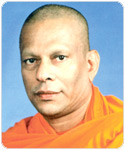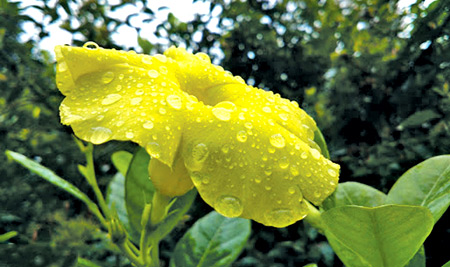|
Ignorance Brings
Suffering
 Weragoda Weragoda
Sarada Maha Thero
"All beings die. Life ends in death. Beings fare according to their deeds,
experiencing the results of their meritorious and sinful deeds. Those who do
sinful deeds go to the woeful states and those who do meritorious deeds, attain
blissful states. Therefore, let one always do good deeds, which serve as a store
for life elsewhere. Meritorious deeds are a great support to beings in the
future world."
Putta m’ atthi dhanamm’ atthi
It ibalo vihannati
Atta hi attano natthi
Kuto putta kuto dhanam?
“Sons have I, wealth have I”,
Thus the fool is fretful.
He himself is not his own,
How then are sons, how wealth?
While residing at the Jetavana Monastery, the Buddha spoke this verse, with
reference to miserly rich man, named Ananda.
There was once a very wealthy man named Ananda in Savatthi. Although he
possessed eighty billion, he was very reluctant to give anything in charity. To
his son, Mulasiri, he used to say, “Don’t think the wealth we have now is very
much. Do not give away anything from what you have, for you must make it grow.
Otherwise, your wealth will dwindle.” This rich man had five pots of gold buried
in his house and he died without revealing their location to his son.
Ananada, the rich man, was reborn, in a village of beggars, not far from
Savatthi. From the time his mother was pregnant, the income of the beggars
decreased; the villagers through there must be a wicked and unlucky once amongst
them. By dividing themselves up into groups and by the process of elimination,
they came to the conclusion that the pregnant beggar woman must be the
unfortunate one. Thus, she was driven out of the village. When her son was born,
the son proved to be extremely ugly and repulsive. His hands and feet and eyes
and ears and nose and mouth were not where they should have been. Terrible
looking that he was he looked like a mud spirit. In spite of this, however, his
mother did not abandon him, for great is the love of a mother for the child she
has carried in her womb. If she went out begging by herself, she would get alms
as before, but if she went out with her son she would get nothing. So, when the
boy could go out by himself, his mother placed a plate in his hand and left him,
saying, “Dear son, because of you we have been brought to great distress. Now we
can support you no longer. In this city meals are provided for poor folk and
travellers. Get your living by begging for alms in this town.” As he wandered
about in Savatthi, he remembered his old house and his past existence. So he
went into the house. When the sons of his son Mulasiri saw him, they were
frightened by his ugly looks and began to cry. The servants then beat him and
threw him out of the house.
The Buddha who was on his alms-round saw the incident and asked Venerable Ananda
to fetch Mulasiri. When Mulasiri came,the Buddha told him that the young beggar
was his own father in his previous existence. But Mulasiri could not believe it.
So, the Buddha directed the beggar boy to show where he had buried his five pots
of gold. Then only, Mulasiri accepted the truth and from that time he became a
devoted lay-disciple of the Buddha. |
